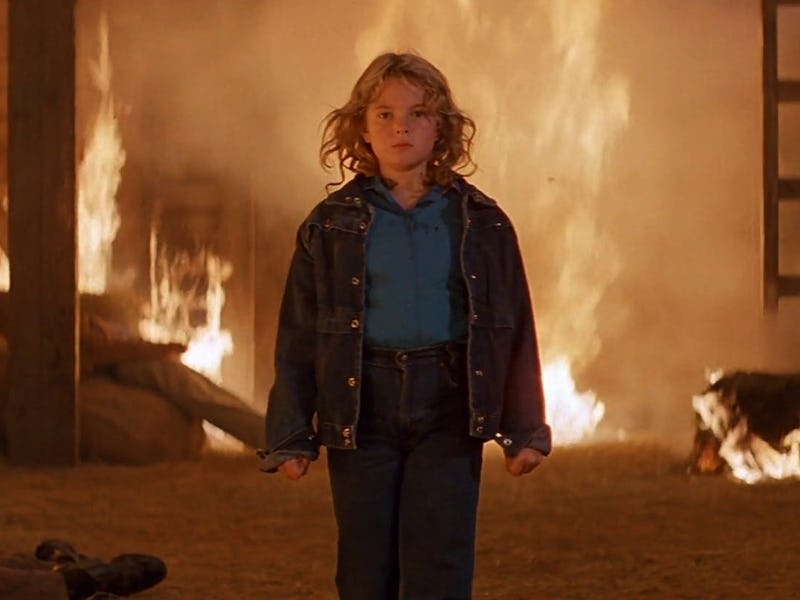Stephen King Hated a 1984 Adaptation of His Work — But Then it Won Him Over
You don’t want to get on Drew Barrymore’s bad side.

Stephen King famously turns into Statler and Waldorf when it comes to reviewing Hollywood adaptations of his work, and in the mid-’80s a new film appeared to incur his wrath every other month. However, the horror maestro’s harshest criticism was reserved for one of the mid-tier transfers from page to screen, the Drew Barrymore-starring Firestarter.
In a damning interview with American Film two years after its 1984 release, King described the supernatural tale as “one of the worst of the bunch,” “flavorless,” and “like cafeteria mashed potatoes,” while also questioning its apparently nonsensical special effects and the cast’s lack of direction. Poor David Keith, who plays mind-controlling father Andy, was singled out not only for his acting skills, but the fact King’s wife said he had “stupid eyes.” Brutal observations obviously run in the family.
Was the author right to stick the knife in so deeply? And should he have accepted more responsibility? Stanley Mann’s script adheres closer to the book than most other King adaptations. And according to director Mark L. Lester (a replacement for John Carpenter, who’d just bombed with The Thing), King’s visual bugbear — the wind that blows every time Barrymore’s moppet Charlie embraces her inner arsonist — was his idea.
For those who haven’t read King’s 1980 novel, or seen its first cinematic incarnation, 2002 Sci-Fi Channel sequel miniseries, or 2022 Zac Efron-fronted remake, Firestarter is the story of an eight-year-old girl who develops pyrokinetic powers thanks to her parents’ involvement in a radical hallucinogenic experiment. The shady federal agency responsible, regular King adversaries The Shop, now wants to harness her superhero-like abilities for nefarious purposes. And they’ll stop at nothing, whether murdering her mother, capturing her father, or hoodwinking her into trusting a creepy assassin who dreams of karate chopping her in the nose, to achieve their goal.
Surprisingly, considering Lester had just helmed the violent revenge thriller Class of 1984, King’s blandness claims are sometimes justified, particularly during the talkier mid-section when Andy and Charlie are separated. The former is subjected to various power-decreasing procedures, while the latter is assigned to live with the manipulative Native American agent Rainbird (a terribly miscast George C. Scott). However, the action on either side is at least elevated to chain restaurant potatoes.
The wind that shook Stephen King.
At first, Charlie’s ability to set anyone she chooses ablaze is played for laughs: see the opening scene where a panicked serviceman immerses his fiery legs in the nearest toilet. But as her temper tantrums become uncontrollable, the film delivers several horrifying (and impressively practical) stunts that result in utter carnage.
Indeed, it’s hard to see exactly why King took umbrage with the effects. The climactic scene is a visual feast as Charlie, determined to avenge her father’s murder and fulfill his dying wish, burns down The Shop’s headquarters. The tween might not have looked particularly menacing, but as she uses her powers to evade bullets and shoot explosive fireballs at every crooked agent while ignoring their pleas for salvation, she’s excitingly merciless.
As for King’s casting issues, David should feel a little hard done by. While not exactly a towering display of charisma, the Golden Globe nominee brings an everyman paternal charm that helps sell the central father-daughter drama and makes Andy’s late demise all the more tragic. Even the performances from Oscar winners Louise Fletcher, Art Carney, and George C. Scott are solid, albeit not spectacular.
Charlie uses her powers to make toast.
King gradually softened his anti-Firestarter stance over the years. In 2021, he reunited with Barrymore on TV’s most personal space-invading talk show to sing both the host’s praises (“I thought you were terrific in that part, that was very, very difficult, and you were great”) and do a complete 180 on Charlie’s fire-starting stance (“Every time you got ready to light a fire, your beautiful blonde hair would blow back. It was great”).
And while King was very much still in anti-David mode during his interview with Vanity Fair a year later, he did acknowledge, “The effects were pretty good for that time.” The film, which grossed a rather modest $17 million worldwide on a $12 million budget, has received a similar reappraisal elsewhere, with certain critics hailing Charlie as a young feminist icon. The Duffer Brothers are obviously fans as well, paying homage to its most iconic image in a promotional campaign for Stranger Things, the Netflix phenomenon it shares more than a few narrative traits with.
The Razzie-nominated remake further highlighted how King’s work isn’t always the easiest source material to adapt. But as the writer eventually conceded, the original Firestarter proves it can occasionally produce a slow burner.